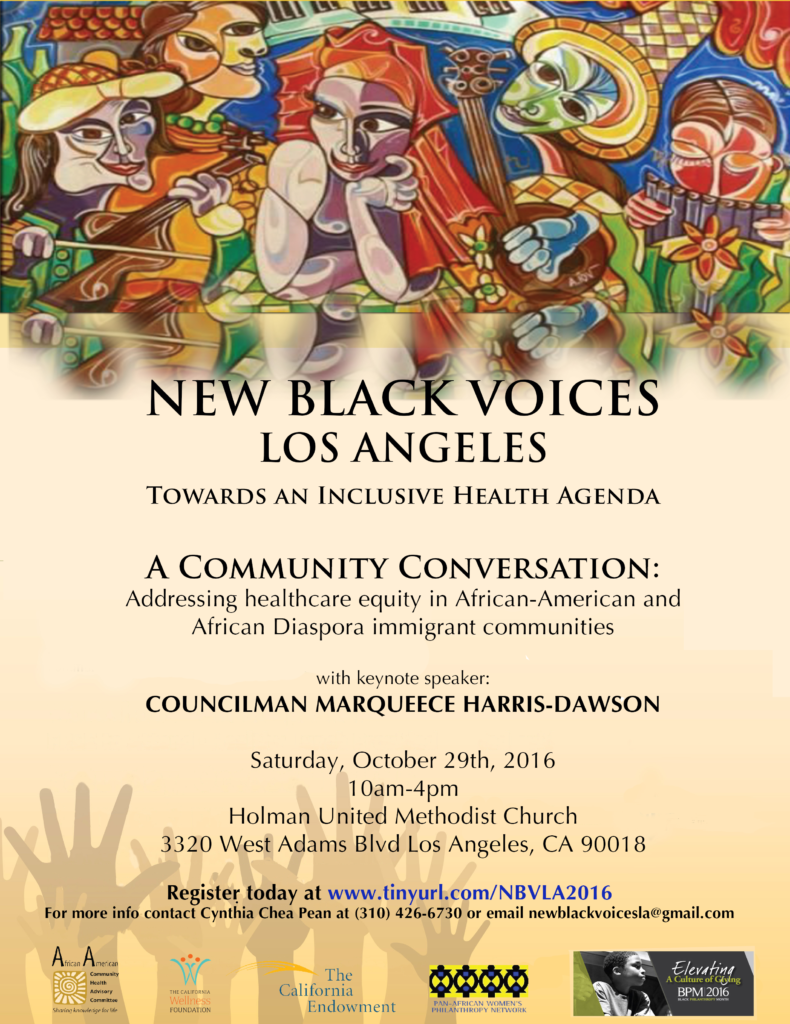Register today at www.tinyurl.com/NBVLA2016
New Black Voices Los Angeles: A Community Discussion
Addressing Health Disparities in the African American
and
African Diaspora Immigrant Communities of Los Angeles
- A New Generation of Black Health Disparity: Overview of the Problem and Opportunity
There has been a 200% increase in the US African immigrant population in the past twenty years. With the country’s second largest African population, California strongly reflects this national trend. Growing black Latino, Caribbean, European and even Asian communities have increased the black community’s ethnic diversity. In some American cities, such as New York, Washington, DC, Atlanta, the Twin Cities, Houston and Los Angeles, black immigrants are now a third or more of the total black population. The Sacramento, the Bay Area, Los Angeles and San Diego metro regions have among California’s largest black communities, including large numbers of immigrants.
However, neither America overall nor California specifically is fully inclusive of the priorities and needs of the new black diversity in its public, nonprofit and foundation sector research or social justice and health improvement programs. Beyond language barriers, immigrant communities, including black ones, have culturally specific health needs, knowledge and practices that are generally not fully accommodated by either majority or mainstream African-American organizations. Of course, the health status of all immigrants tends to decline especially by the second generation of assimilation to America.
Second generation African maternal and infant mortality, diabetes, hypertension and heart disease are approaching the same disproportionally high levels of the historic African-American community. An especially alarming development just beginning to attract attention in the health system is that American-born Somali children now seem to have our country’s highest rates of autism, although there does not seem to be any notable precedent for the condition in East Africa. The US is creating a new generation of African-descent Americans who have high levels of disease sustaining an abysmal and unacceptable legacy disparity.
Despite the very real and increasingly shared, key health challenges faced by black immigrant and US-born communities, there is tremendous health knowledge, exemplary wellness practices and organizations that have made progress in addressing the issues. The collective impact of the black health equity movement is hampered by fragmentation among the various organizations and limited mechanisms for intercultural exchange of ideas and joint social action.
- New Black Voices Health Panel: A First Step Towards an Inclusive Health Equity Movement
Unfortunately, emerging black immigrant health disparities trends are generally not being addressed in California. Most black health outreach, policy change initiatives and summits focus mostly on African-Americans with limited inclusion of black immigrant issues.
Recognizing that California leaders are convening now to create regional and then statewide black health agendas, the AACHAC and PAWPNet are convening the New Black Voices Health Panel Discussions throughout the state to map and devise an initial regional and statewide black health agenda. The next such event will be held on October 29, 2016 at Holman United Methodist Church in Los Angeles.


